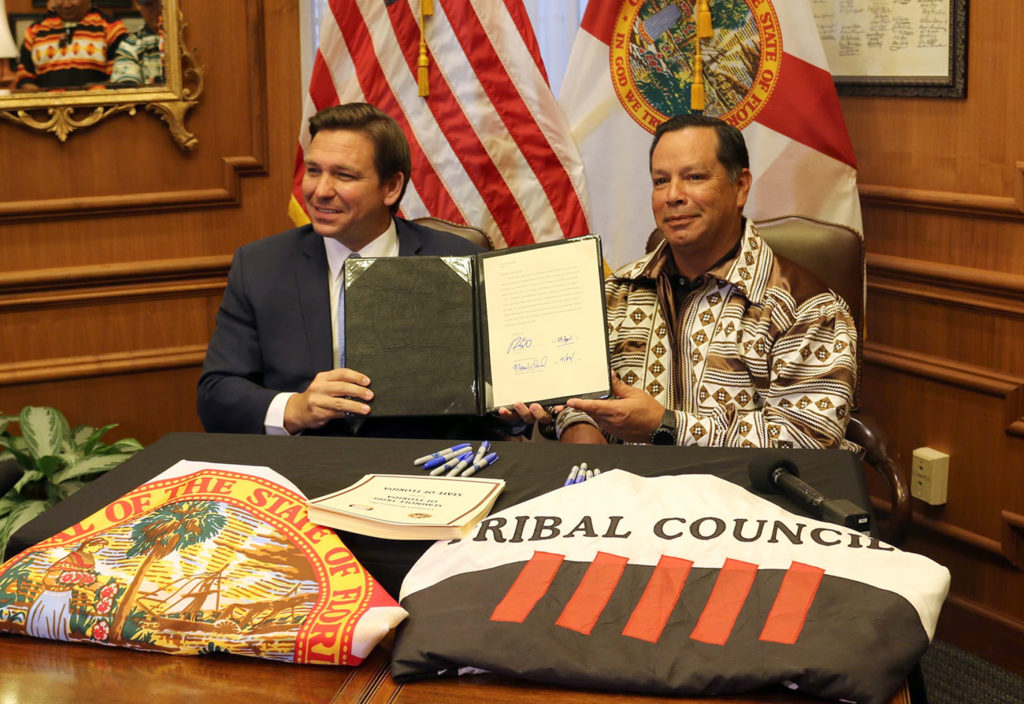
After a long wait, the Florida Legislature, the office of Governor Ron DeSantis and the office of Seminole Tribe chair Marcellus Osceola, Jr., got the answer they were waiting for. The U. S. Department of the Interior, by taking no action against the compact signed in April, has given their consent to said compact. That does not spell the end of the road for the deal, however, as there are legal challenges pending the compact and aspects of the compact were denied by the Department of the Interior.
Sports Betting Approved, But…
The Department of the Interior had 45 days after the Florida Legislature ratified the compact that DeSantis and Osceola signed at the end of April. The legislators did their job on May 7, with the bicameral Legislature approving the new compact. The deal, however, could not take effect until Interior officials, who are responsible for tribal gaming in the U. S., put their seal of approval on the subject.
That decision came late Friday in a simple statement from Bryan Newland, the Principal Deputy Assistant Secretary of Indian Affairs, which gave the approval of the Interior Department. “After thorough review under IGRA (the Indian Gaming Regulatory Act of 1988), we have taken no action to approve or disapprove the Compact before August 5, 2021, the 45th day,” the paragraph states. “As a result, the Compact is considered to have been approved by operation of law to the extent that it complies with IGRA and existing Federal law. The Compact will become effective upon the publication of notice in the Federal Register.”
There is a 60-day grace period built into the compact signed by DeSantis and Osceola, meaning that the first days that the Seminole properties in the state of Florida could accept sports bets would be October 15. Those bets, however, can only be accepted on the Hard Rock properties of the Seminole tribe and through a digital sportsbook offered by the Seminoles with the Hard Rock branding.
That isn’t going to sit well with the poker rooms and horse racing tracks in the Sunshine State, who were set to receive the ability to accept bets on their properties, transmit the bets to the Seminoles and keep 60% of the action. This pari-mutuel action was denied by the Interior Department, however, during their review of the compact. This means that such areas as the Bonita Springs Poker Room, Silks Poker Room in Tampa, or Derby Lane in St. Petersburg (among others) will not be able to offer sports betting.
Legal Challenges Await
There are legal and constitutional challenges that could knock out the compact before it even starts.
In July, the Bonita Springs Poker Room joined forces with Magic City Casino in filing a lawsuit questioning the legality of the new compact. In that lawsuit, the parties maintained that the compact violated the IGRA. This might be a moot point, however, as the Department of the Interior found that it did not violate any law, but that is why there are courts to decide this issue.
Another hindrance to the compact could be something that the Seminoles pushed extremely hard in 2018. Amendment 3, an amendment to push for statewide voter approval of all changes to casino gaming, passed by an overwhelming margin. The amendment drive then was driven by the Seminoles (along with The Disney Corporation) to ensure that there would not be expansion of gaming in the state. Many in the Florida legal community and in political circles see the compact as a circumvention of Amendment 3 and thereby illegal.
What may be more of an obstacle would be moves by two of the powers in daily fantasy sports (DFS) that have also been able to work their way into sports betting. DraftKings and FanDuel have launched petition drives that would look to allow sports betting by amending the Florida Constitution. If these petition drives are successful, make the 2022 ballot and are approved by the voters (a 60% vote for approval would have to be met), then it would override the Seminole stronghold on sports betting in the Sunshine State.
What is at stake? The 30-year deal between the Seminole Indians and the state of Florida could result in $15 BILLION going into the coffers of the Florida government. If there is not a compact, then the state is out a huge chunk of revenues that they count on.
While there has been movement in the fight over gaming in the state of Florida, it is obvious that the war is still going on.























